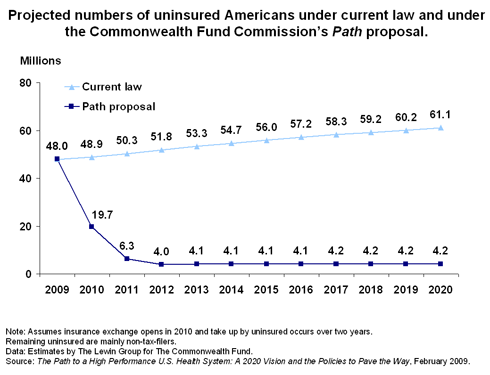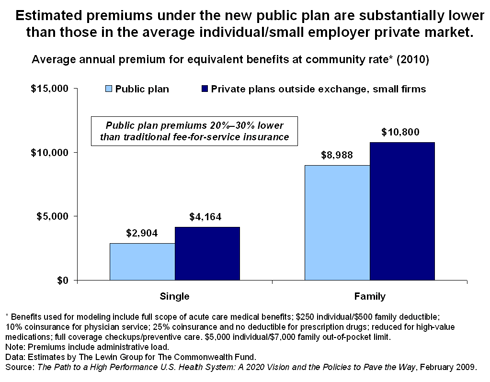A comprehensive package of health insurance, provider payment, and health system reforms could guarantee affordable coverage, improve health outcomes, and slow the growth of health spending by $3 trillion by the end of the next decade, according to an analysis released February 19 by The Commonwealth Fund Commission on a High Performance Health System.
The report, The Path to a High Performance U.S. Health System: A 2020 Vision and the Policies to Pave the Way, describes a set of strategic, integrated policies designed to make the health care system work better for patients, families, and businesses. Analysts project the number of uninsured to increase to 61 million over the next decade and national health spending to double to $5.2 trillion by 2020, if reform is not enacted.
At the core of the Commission’s proposal is a national health insurance exchange that would ensure everyone has access to affordable coverage. A public plan option would be made available alongside a variety of private plans, with income-related assistance provided to keep low-wage earners from spending more than 5 percent of their income on insurance premiums, and middle-income individuals from spending more than 10 percent of income on premiums. A minimum standard of coverage would protect public and private plan enrollees alike from ruinous medical expenses. And no one could be turned down, or charged more, for coverage because they have a medical condition or are at high risk for developing one.
As a result of these reforms, the number of uninsured—which now stands at 46 million and is projected to rise to 61 million in 2020—would fall to an estimated 4 million, or about 1 percent of the U.S. population.

Insurance reform, however, is only one piece of the package. The Commission also recommends changes in the way health care is organized and the way hospitals and doctors are paid.
For example, all patients would be encouraged to enroll with a physician or nurse practitioner practice that meets the standards of a “patient-centered medical home” that makes care available around the clock and employs information technology and office systems to make sure patients get all recommended care. Such physician practices would be rewarded with an extra medical-home fee paid by insurers and public programs, as well as extra bonuses for high performance in preventive care and chronic care management. In addition, physicians would be encouraged to practice in more integrated delivery systems or virtual networks, working as part of a team with other physicians, nurses, pharmacists, and other health professionals to provide patients with more coordinated, accountable care.
Savings All Around
The average family would save $1,140 in 2010 under the plan, thanks to reforms that reduce administrative costs, promote efficiency, and guarantee financial protection from health care bills. By 2020, the average family would save $2,314. Furthermore, by rationalizing the health system, the Commission’s strategic approach could substantially slow the annual increase in national health spending, reducing the rate of growth from 6.7 percent yearly to 5.5 percent.

While they acknowledge the political perils involved in enacting some of the reforms, the report’s authors insist these changes are necessary to put the U.S. health system on a new course. “The central message is that we all stand to gain by taking bold action,” said Commonwealth Fund Senior Vice President and lead author Cathy Schoen, who is also the Commission’s research director. “With middle-income as well as low-income families at risk, and businesses struggling to provide insurance for their employees, there is broad public support for fundamental change.”
"The Commission recognizes that reforms won't be easy," added James J. Mongan, M.D., the Commission's chairman and the president and CEO of Partners HealthCare in Boston. "Yet, if we fail to act, the situation we face in the future will be much worse."